I'm all about teaching children how to work in a fun and enjoyable way. At their ages, they are naturally interested in what I am doing and they don't think of it as drudgery, they think it is FUN! I want to cultivate a good work ethic in them now, but teaching them how to work in the garden means doing a bit of damage control, learning to let go a little bit of my expectations of perfection, and cultivating patience and love in how I teach them. It's an opportunity for growth all around.
I do not claim to have the perfect system here, but I'll share a little bit of what is working for us and the Littles - one pre-schooler and one older baby.
- Set clear boundaries
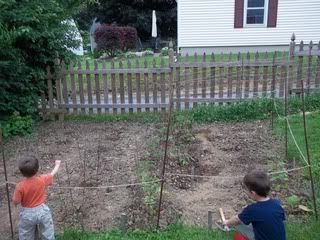
For half of the year, the Littles have free reign to dig around in the dirt, but once we start planting tender seedlings, they are not allowed to go into the garden for a while. They don't know to look down and walk carefully around baby plants, so we just keep them out until the garden has matured and the paths are obvious. (If we've kept up with the weeding, that is!) We've found putting up this very simple reminder in the way of some re-bar and twine helps them remember the new boundary.
- Give them hard jobs and praise them for their efforts

Our family motto: Do Hard Things. We borrowed this idea from the Harris brothers' book by the same title, which I highly recommend. "Hard Things" for a little one in the garden may be something like collecting all of the weeds you pull into a bucket and taking them to the compost, or carrying rocks to the rock pile. It may be taking the green beans or peas you have picked and putting them into a bowl at the end of the row. It may be digging up a stubborn weed. Look for jobs that will stretch their abilities just a little bit, praise them for their strength and skill, and you will have some happy workers that take pride in a job well done.
- But not too hard!
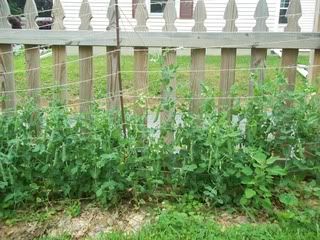
The goal is to keep them busy doing productive (rather than destructive) things when they want to get involved in what you are doing. They are not slaves, so allow little ones to get distracted with a stick or a worm if their attention wanes. If you give them a job that is just too much for them, they will become discouraged. It's a fine line and takes some experimentation.
For instance, Big Little really wanted to pick peas like I was doing. I showed him how to look for pods that were ripe (nice and fat, visible outlines of the individual peas showing) and let him try to pull one. That didn't go very well. He nearly yanked the plant out of the ground, which would have been sad, but ok (see my last point). So I tried holding the plant for him and showing him where to pull. Still didn't work. Those peas are tough! I quickly gave him a different job to hold his interest. When all else fails, let them munch. ;) (See the second to last point.)
- Give them real tools, their own plot of land, and some seeds
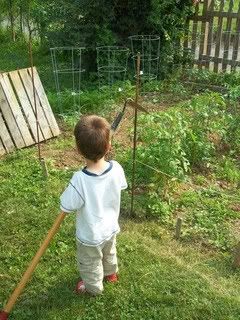
Yesterday, I held out the small trowel and the large hoe and asked Big Littles to choose one to carry for me. He picked the large hoe of course! (Little Littles loved toddling with the trowel though.) Don't bother buying plastic junk, just let them play with the real thing. Teach them safety (don't leave the rake lying on the ground with the teeth point up) and how to respect tools (put them away when you are finished), but let them try doing real work with real tools with real seeds and dirt.
- Teach them to respect the plants as a food source
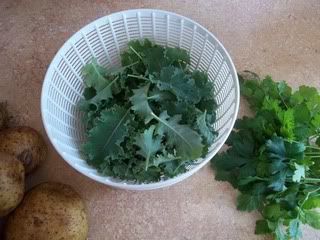
This one has made a really big difference with the pre-school child... the baby? Not so much, but we'll get there! We have an ongoing dialogue... "Watch where you step! Those baby plants are going to be our food!" "Don't pull out the lettuce! That is our food to eat!" "Don't kick your ball into the tomatoes, they are our food!" And so forth. It really has helped to enforce those boundaries and to help them understand that the garden is more than a big sandbox in which to play.
- "Do not muzzle the ox..."
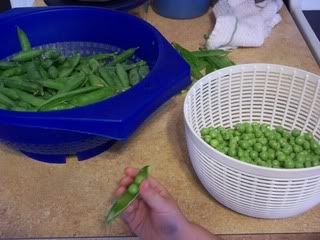
When the child is helping you in the garden and wants to eat some pea pods or a green bean straight from the vine, why on earth do we say no? I found myself saying no one day because it was right before dinner and then I stopped myself in my tracks. Why am I telling my child that he cannot eat fresh veggies? How many night do I find myself urging this very little one to eat veggies? A lot! (Big Littles has gotten pickier in the past year. We mostly ignore it, but veggie consumption takes more urging these days.) So I have started allowing unlimited fresh veggie snacking in the afternoons. They can eat from the garden, they can eat what I'm chopping for dinner, they can taste to their little heart's delight, and especially while they are "helping". As I titled this section, "Do not muzzle the ox"... the Bible says a laborer deserves wages, so I allow little workers to snack while they are helping.
- Just let go!
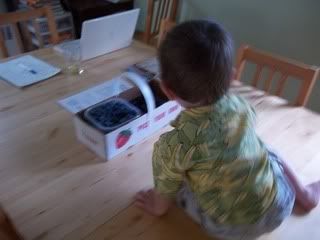
Let go of your perfectionism. People are more important than things! You may lose some of your crop to an enthusiastic helper. It is sad when it happens, but it is ok. If possible, plant extra in anticipation. Have patience and remember that tending those budding little souls is of eternal significance, while your garden is not.
The story of the final picture: While showing Big Littles how to shell peas, Little Littles sneaked onto the dining room table and greedily started eating the blueberries brought that afternoon by a friend. Of course, I had to get a picture before administering the necessary consequences. ;)
This post is a part of the Busy Mom's Guide to Frugal Gardening linkup.

No comments:
Post a Comment